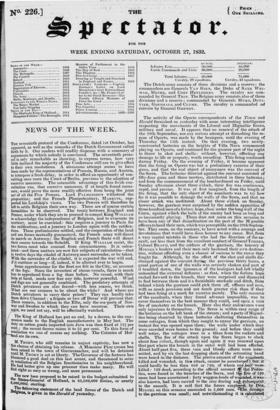NEWS OF THE WEEK.
THE seventieth protocol of the Conference, dated 1st October, has appeared, as well as the remarks of the Dutch Government called forth by it. Our readers will readily dispense with a summary of arguments by which nobody is convinced. The seventieth proto- col is only remarkable as showing, in express terms, how very little inclined the majority of the Conference still are to give effect to their own resolutions. A strenuous attempt seems to have been made by the representatives of Prussia, Russia, and Austria, to interpose.a fresh delay, in order to afford an opportunity Of con- sulting once more the Court of Berlin, previous to the adoption of coercive measures. The ostensible advantage of this fresh con- sultation was, that coercive measures, if at length found neces- sary, would prove the more readily effective from being the joint act of all the Five Powers. Lord PALMERSTON withstood the proposition; and the French Plenipotentiary, MARHUIL, sup- ported his Lordship's views. The two Powers will therefore be left to settle Belgium their own way. There are of course certain formalities to be observed. The treaty between England and. France, under which they are to proceed to compel King WILLIAM to acknowledge the independence of Belgium, and to evacuate its territory, must be executed: this requires a journey to Paris for the ratifications, and a journey to London again with the.ratifica- tons. These preliminaries settled, and the cooperation of the land and sea forces mutually guaranteed, the French army will direct its march on Antwerp ; the'English and French fleets will direct - their course towards the Scheldt. If King WILLIAM resist, the two forces must take counsel from circumstances. It is calca- lated—and these matters are now fair subjects of calculation-that in twelve days the "citadel of Antwerp must surrender, or be taken. With the surrender of the citadel, it is expected the war will end, if it continue So long—if, indeed, it be allowed ever to begin. Some apprehensions for the fleet are felt in the City, on account of the fogs. Since the invention of steam-veisels, there is much less to apprehend from a fog than before.. No vessel, with their. help at hand, needs now fear any tide, however powerful. Wind and fogs are not generally combined. The predatory attempts of. Dutch privateers are also feared—with less reason, we think. What are our cruisers to be about the while? And where are Dutch privateers to carry their prizes? They can hardly take them down Channel : • a frigate or two off Dover will prevent that. There remain, in addition to the Elbe, only the sea-ports of Nor- way and Sweden to which they can have recourse. Their own coast, we need not say, will be effectually watched.
The King of Holland has put an end, by a decree, to the con- cession made to the English manufacturers in May last. The duty on cotton goods imported into Java was then fixed at 121- per Cent; the recent decree raises it to 25 per cent. To this form of retaliation we can of course say nothino.. The Colonies of Hol-
nd are its own. r" _M. Trdoax, who still remains in unjust captivity, has now a fair.chance of ebtaining his release. A Monsieur PESCATORE has
en seized in the town of Grevenmaeher, and will be detained until M. THORN is set at liberty. The Governor of the fortress has !?iustered a good deal on this last arreSt, and threatened to seize' 1n retaliation all the Belgian functicinaries in his nei,ghbourhood. He had better give up one prisoner than make. many. He will fiIi d right as easy as wrong, and more permanent.
The new loan proposed to be raised in the budget submitted to the States-General of Holland, is 93,500,000 florins, or nearly 8,000;0001 sterling. The following statement of the land " fermi of the Dutch and PM;is given m the Herald of yesterday.
DUTCH. BELGIAN.
Infantry Line 30,000 55,000
Garde Communale and Civic 30,000 20,000 Total Infantry 60,000 75,000 Cavalry, 29 squadrons. Cavalry, 42 squadrons.
The Dutch army consists of three divisions and a reserve; the commanders are Generals VAN G1EN, the Duke of SAXE WEI- MAR, MEYER, and CORT HEYLEGERS. The cavalry are Com- manded by General TRIP. The Belgian army consists also of three divisions and a reserve ; commanded by Generals HUED, MITI- TIER, GOETHALS, and CLUMP. The cavalry is commanded ad interim by General GHENGY.


























